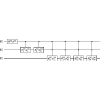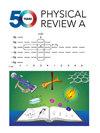高效制备稀疏状态的简单量子算法
IF 2.9
2区 物理与天体物理
Q2 Physics and Astronomy
引用次数: 0
摘要
状态准备是量子计算中的一项基本工作,人们为此提出了许多算法。其中,最简单的可能是格罗弗-鲁道夫算法。在本文中,我们分析了当需要准备的状态稀疏时该算法的性能。我们证明,门复杂度与状态中的非零振幅数呈线性关系,与量子比特数呈二次关系。然后,我们对算法进行了简单的修改,使其与量子比特数的关系也变为线性。这与已知的稀疏状态准备算法相比,具有很强的竞争力。本文章由计算机程序翻译,如有差异,请以英文原文为准。

Simple quantum algorithm to efficiently prepare sparse states
State preparation is a fundamental routine in quantum computation, for which many algorithms have been proposed. Among them, perhaps the simplest one is the Grover-Rudolph algorithm. In this paper we analyze the performance of this algorithm when the state to prepare is sparse. We show that the gate complexity is linear in the number of nonzero amplitudes in the state and quadratic in the number of qubits. We then introduce a simple modification of the algorithm, which makes the dependence on the number of qubits also linear. This is competitive with the best known algorithms for sparse state preparation.
求助全文
通过发布文献求助,成功后即可免费获取论文全文。
去求助
来源期刊

Physical Review A
物理-光学
CiteScore
5.40
自引率
24.10%
发文量
0
审稿时长
2.2 months
期刊介绍:
Physical Review A (PRA) publishes important developments in the rapidly evolving areas of atomic, molecular, and optical (AMO) physics, quantum information, and related fundamental concepts.
PRA covers atomic, molecular, and optical physics, foundations of quantum mechanics, and quantum information, including:
-Fundamental concepts
-Quantum information
-Atomic and molecular structure and dynamics; high-precision measurement
-Atomic and molecular collisions and interactions
-Atomic and molecular processes in external fields, including interactions with strong fields and short pulses
-Matter waves and collective properties of cold atoms and molecules
-Quantum optics, physics of lasers, nonlinear optics, and classical optics
 求助内容:
求助内容: 应助结果提醒方式:
应助结果提醒方式:


